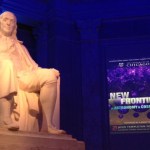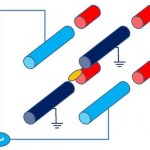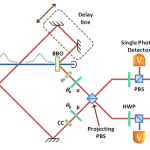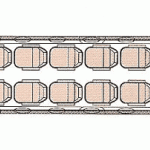Science
The second session of the New Frontiers in Astronomy and Cosmology conference was friday afternoon.
The plan was to do a leisurely liveblog of the talks.
However, during lunch, there were some interesting developments, which I can hopefully tell you about next week some time, and in the middle of the discussion I was told that I was the session chair for the afternoon and we were starting in two minutes.
And a brilliant session it was too.
But as chair it was a bit hard to take notes and blog it live...
So you get the tape delayed version, editors cut, instead:
We continued after lunch with…
A slow liveblog of the conference.
The New Frontiers in Astronomy and Comsology is having its awards conference at the Franklin Institute in Philadelphia.
The 20 odd winning researchers and research groups are presenting summaries of their proposed research, to be followed in a couple of years with another conference in Chicago where they will, hopefully, present their results.
The high school and college essay winners are also here to receive their awards and schmooze with the random astroboffins.
I plan to do my usual intermittent blogging of the presentations, time permitting.
The list…
Or, how may hours should graduate students work?
Well, depends...
However Many You Like
As Many As They Can
As Many As Are Needed
All Of Them
The answer may sometimes lie in the above range, sometimes may be somewhat less, and occasionally even more.
We've all been there, and all suffer from survivor bias, confirmation bias and not a little survivor's guilt.
The occasion of course, is The Letter very helpfully sent to all the astronomy graduate students at a distinguished research university by a well intentioned distinguished faculty member.
It is causing quite the buzz in astro social…
It's a banner day for science explainer things I wrote, as a piece I wrote has just gone live at Tor.com:
Why Gandalf Is Wrong
Even as a kid, reading J. R. R. Tolkien’s The Lord of the Rings at the golden age of twelve or so, Gandalf’s response to Saruman never sat well with me. Splitting white light into its component colors is awesome, and taking things apart is the best way to learn how they work. Knowing how things work is the first step toward making them work better, a process that leads to the technologies that make modern life comfortable enough to, among other things, provide Oxford…
In which we do a little imaginary Q&A to explain the significance of Tuesday's Nobel Prize to Dave Wineland and Serge Haroche.
------------
I did a quick post Tuesday morning noting that the latest Nobel Prize in Physics was awarded to two big names from my corner of the field. This would've been a great time to drop a long explainer post about what they did and why it's cool, but alas, I have a day job, and the Nobel committee stubbornly refuses to tell me who they're giving the prizes to in advance. Oh, well.
Still, I'm just vain enough to think I can add something a little different…
The 2012 Nobel Prize in Physics was announced this morning, going to Serge Haroche and Dave Wineland, "for ground-breaking experimental methods that enable measuring and manipulation of individual quantum systems". This isn't a pair that was getting much love from the prognosticators, but they're an excellent choice. And, in fact, commenter KSC correctly picked Wineland in the betting pool and narrowly missed also getting Haroche.
Wineland has been on my mental list of people who ought to get a Nobel for a while, especially because he easily could've had a piece of the 1997 prize for laser…
One of the hazards of standing up for science and science-based medicine (and against cranks) is that some of these cranks will try to contact you at work. That's why I have a policy about blog-related e-mails sent to me work address, and that policy is that I usually ignore them, whereas I might actually respond if it's sent to my blog e-mail address. Well, it's not an absolute policy. If it's a reporter or fellow skeptic who contacts me at work, I might well respond from my blog address, but crank e-mails sent to my work address are 100% guaranteed to be sent straight to the metaphorical…
In which we have the next round of the conversation with Puff the Mutant Dragon. Previous entries here and there.
------------
Amusingly, your post was singled out for high praise in the Knight Science Journalism Tracker review of the book. Probably because Deborah Blum, who wrote it, wrote a book about poisons, so the topic was close to her interests, but still, congrats.
You're definitely right about blogging being a weird hobby. I think it's one of the more interesting but less examined aspects of the rise of social media that there's been this explosion of text writing by all sorts of…
Watch the following video without reading any context. Listen to what the guy says. Note that he says that evolution and embryology are lies from hell. Note that he claims that these lies have one purpose: To keep us from knowing that we need a savior. Note that he claims that the earth was create in 6 literal days about 9,000 years ago (why not 6,000 is a topic of another post some time, perhaps). Note that he claims that the Bible teaches us how we run our lives, our families and our churches, but most importantly, note that this man is saying that the bible, which he takes absolutely…
In which we do a little ResearchBlogging to look at a new paper about weird quantum effects, entangling two photons that never both exist at the same time.
------------
I'm teaching full-time this term, but I've blocked out Thursdays as a day when I don't do class- or chair-related work. Usually, this means trying to write something on the work-in-progress, but I finished a short thing in the morning that needed to sit for a few hours before I looked at it again, which left a nice opportunity for some blogging. And, conveniently, somebody retweeted a New Scientist story about an arXiv…
In which we win an award from the New Frontiers in Astronomy Program.
The New Frontiers in Astronomy and Cosmology program announced its research grant award winners yesterday.
The last, but not least of the Big Questions solicited in the Call for Proposals, was:
Are we alone in the universe? Or, are there other life and intelligence beyond the solar system?
There were four awards in this "Astrobiology and SETI" category, focusing on different approaches in the search for life elsewhere in the Universe.
We got one:
"Constraining the Abundance of Kardashev Type II and III Civilizations From…
The New Frontiers in Astronomy and Cosmology program included 20 awards for 2 year research projects on Big Questions.
The winners are:
Big Question I
What was the earliest state of the universe?
Detecting Cosmic Superstrings
David Chernoff, Cornell University
Co-Investigator: Henry Tye, Hong Kong University of Science and Technology
CosmoArchaeology: Digging for the Initial State
Richard Holman, Carnegie Mellon University
Co-Investigators: Shirley Ho, Carnegie Mellon University; Sarah Shandera, The Pennsylvania State University; Nishant Agarwal, Carnegie Mellon University; Ross O’Connell…
The New Frontiers in Astronomy and Cosmology program has
announced its Award winners!
The $4+ million in awards went to 20 scientists studying Big Questions on fundamental issues and 21 high school and university student essay prize winners.
The awards will be presented at a conference at the Franklin Institute in Philadelphia next week.
The program is funded by the Templeton Foundation as part of its celebration of the centennial of the birth of its founder, John Templeton.
The topics solicited for the Big Questions were very interesting:
What was the earliest state of the universe?
What…
It's that time of year again, when everybody pays attention to Sweden for a couple of months: the 2012 Nobel Prizes are about to be announced. Which means it's time for the game everybody loves to tolerate: the Uncertain Principles Nobel Betting Pool:
Leave a comment to this post predicting at least one of the winners of one of this year's Nobel Prizes. If one of your guesses turns out to be correct, you win the highly coveted right to choose the topic of a future blog post.
I'm adding an additional restriction to this year's contest, though: You're not allowed to pick anything related to…
In which we use math and physics to show that the pilots of my flight from Toronto to Albany this past weekend were full of crap.
------------
As previously noted, I was in Waterloo, Ontario this past weekend for the Open House at the University of Waterloo's new Quantum Nano Center. My talk went very well, save for some new-building technical glitches, and video of both the talk and the panel discussion should be posted to their web page soonish-- I'll post a link when it goes up.
The trip back from Toronto was slightly marred by the fact that the gates from which the tiny little prop planes…
My post post Faster Than a Speeding Photon, doing a Q&A explainer of the OPERA fast-neutrino measurement was picked for inclusion in The Best Science Writing Online 2012 (confusingly published in late 2012, featuring blog posts from 2011...). As promotion for the book, it was suggested that pairs of authors from the collection "interview" each other about their posts, blogging, and whatever else, and I was paired with Puff the Mutant Dragon.
We exchanged several emails over a week or so, and thought about cutting them up into typical Q&A type "interview" posts. That seemed like it…
SCENE: The library at Chateau Steelypips. DADDY is typing on the computer, while THE PIP plays on the floor. Enter STEELYKID.
STEELYKID: I'm already four years old.
DADDY: Yes, yes you are.
THE PIP: Thbbbbbbbpppt!
STEELYKID: How old is The Pip?
DADDY: Eleven months. Not quite one year.
STEELYKID: When The Pip is four, how old will I be?
DADDY: You'll be seven.
STEELYKID: And when he's seven, how old will I be?
DADDY: You'll be ten.
THE PIP: (pulls himself to a standing position) GA BA DA BA Phbbbbt! (falls down)
STEELYKID: Daddy, how old are you?
DADDY: I'm forty-one.
STEELYKID: And when I'm…
There's an oft-quoted saying that's become a bit of a cliché among skeptics that goes something like this: There are two kinds of medicine: medicine that's been proven scientifically to work, and medicine that hasn't. This is then often followed up with a rhetorical question and its answer: What do call "alternative medicine" that's been proven to work? Medicine. Of course, being the kind of guy that I am, I have to make it a bit more complicated than that while driving home in essence the same message. In my hands, the way this argument goes is that the whole concept of "alternative"…
There's been a lot of bloggage recently about a new study in the Proceedings of the National Academy of Sciences indicating bias toward male students on the part of faculty who thought they were evaluating an application for a laboratory manager. Half of the faculty in the study were given an application with "Jennifer" at the top, the other half one with "John" as the first name, and both male and female faculty rated the male student more highly, and would offer the male student a higher salary. Sean Carroll and Ilana Yurkiewicz talk about the study and the results in more detail.
So,…
Ideologically motivated bad science, pseudoscience, misinformation, and lies irritate me. In fact, arguably, they are the very reason I started this blog. True, over time my focus has narrowed. I used to write a lot more about creationism, more general skeptical topics, Holocaust denial, 9/11 Trutherism, and the like, but these days I rarely write about topics that don't have anything to do with medicine. Sometimes, it even seems that I've narrowed my focus to the point that all I write about is antivaccine nonsense. That doesn't mean that I've lost interest; rather it's that over time I've…




